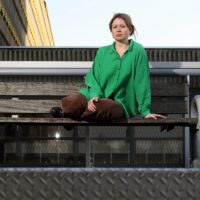Go where poetry can find you
Could a Large Language Model like GPT-4 ever truly write poetry, Jenna Pfeifer wonders. She is not afraid of the emergence of AI in our creative lives.
Could a Large Language Model like GPT-4 ever truly write poetry, Jenna Pfeifer wonders. She is not afraid of the emergence of AI in our creative lives.

(Photo: Sam Rentmeester)
When you hear the word poetry, what comes to mind? Shakespearean sonnets, or playful limericks? Maybe a lingering sense of perplexity and panic left from English classes? At least that’s how I felt until one day, pressed for a birthday gift for my mum, I sat down to write a message. The words wandered around the page and shaped themselves into a poem. By day’s end, I had more than a child’s declaration of love and gratitude. I had discovered poetry itself, a new way to move through the world.
So if you find poetry confusing or inaccessible, where should you begin? My spirit animal, Winnie the Pooh (aka A.A. Milne) says ‘It isn’t easy because Poetry and Hums aren’t things which you get, they’re things which get you. And all you can do is go where they can find you’. Poetry invites us, in the words of Mary Oliver, to ‘Pay attention. Be astonished. Tell about it’.
I often find myself lost for words to describe my own experience. When I first began reading and writing poetry, I fixated on what each word was supposed to mean. But I was asking the wrong question. A poem isn’t supposed to explain, rather it embodies. Much like dance, it speaks through movement, rhythm, and space. We never ask dancers what their movements ‘mean’ as the dance itself is the meaning. Poetry allows us to step beyond the constraints of ordinary language, using words to go to a place beyond words. For example, what does hope mean to you? Hope can be The Thing with Feathers or … the Invisible Gift, what we see when we stare long enough into nothing. Or both, or neither.
While poetry uses metaphor, it is itself a metaphor
Indeed, poetry’s relationship with language is fragile and imperfect, much like our relationships with each other and the world around us. In this way, while poetry uses metaphor, it is itself a metaphor. And metaphors are our bridges to understanding intangible emotions, our way of mapping abstract experiences onto something sensory and familiar. Without them, how can we speak of grief without the broken heart, or relief without its stop and start? Metaphors aid us in both understanding and transforming human feelings and attitudes.
This deep connection between language, feeling, and lived experience raises an interesting question in our present technology. Could a Large Language Model like GPT-4 ever truly write poetry? Could AI craft a metaphor that transforms a human heart or a worldview? Perhaps it could generate something plausible. But would it feel it? Would it understand the embodied truth beneath the metaphor, the way our bodies and minds anchor meaning? In my opinion, for a metaphor or poetry to take hold we need the writer and the reader. This intimacy between both minds is crucial.
For these reasons, I am not afraid, at least for now, of the emergence of AI in our creative lives. If anything, it serves as a reminder to hold tightly to what is human, to our metaphors, our tangled lives, our contradictory realities. Poetry is not just words; it’s a way of making sense of the world, of sharing the weight of being alive with someone else. And in that sharing, there is connection, fragile and imperfect, like poetry itself. So plant your wildflowers, sand your wooden beams, touch your lovers, write your poems. There is only one instruction: go where all of this can find you.
If you want to read some of Jenna’s poetry you can find it on Substack.
Jenna Pfeifer is a PhD student in Biomechanical Engineering and Cognitive robotics, Faculty of Mechanical Engineering. Her research focuses on the Effects of Technology on Youth Loneliness. Jenna writes to understand the world better by attempting to merge two perspectives: the scientific and the poetic.
Comments are closed.